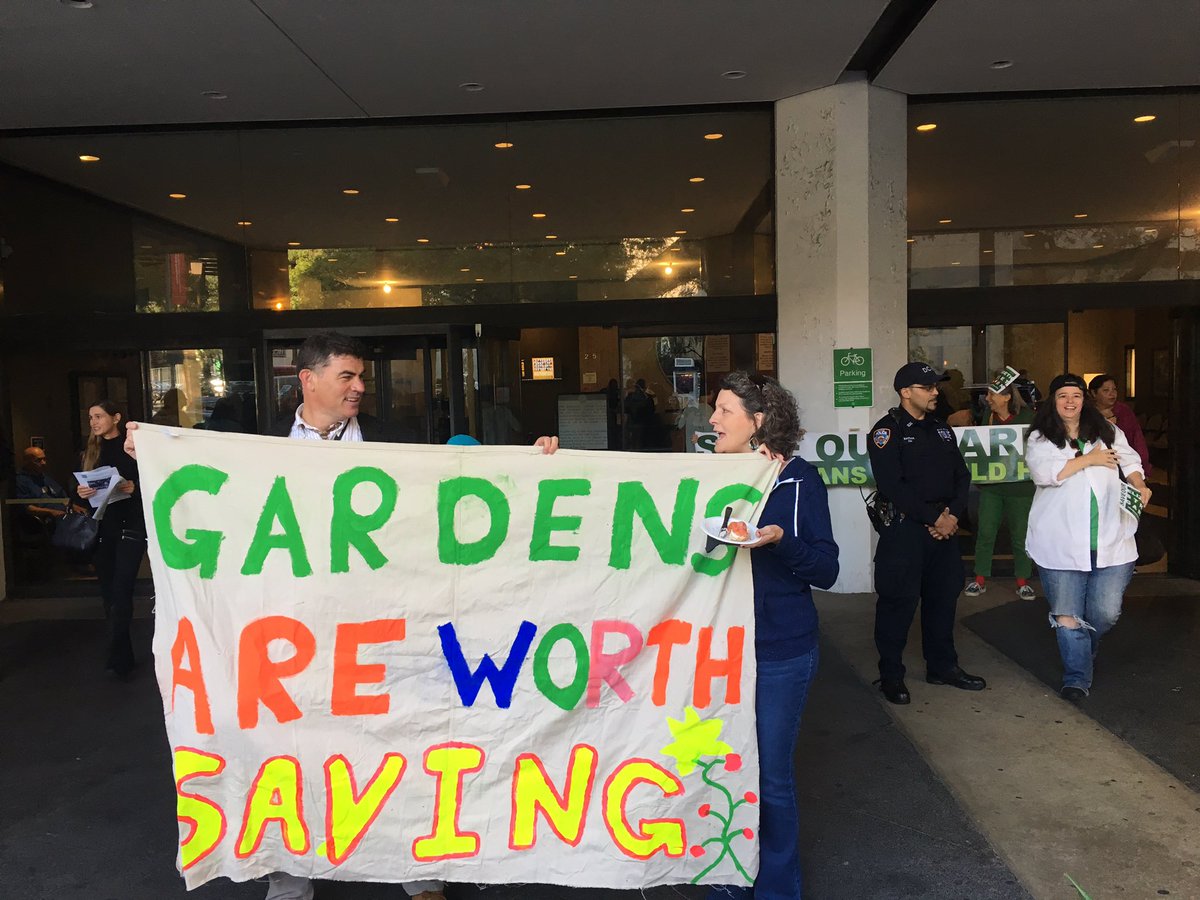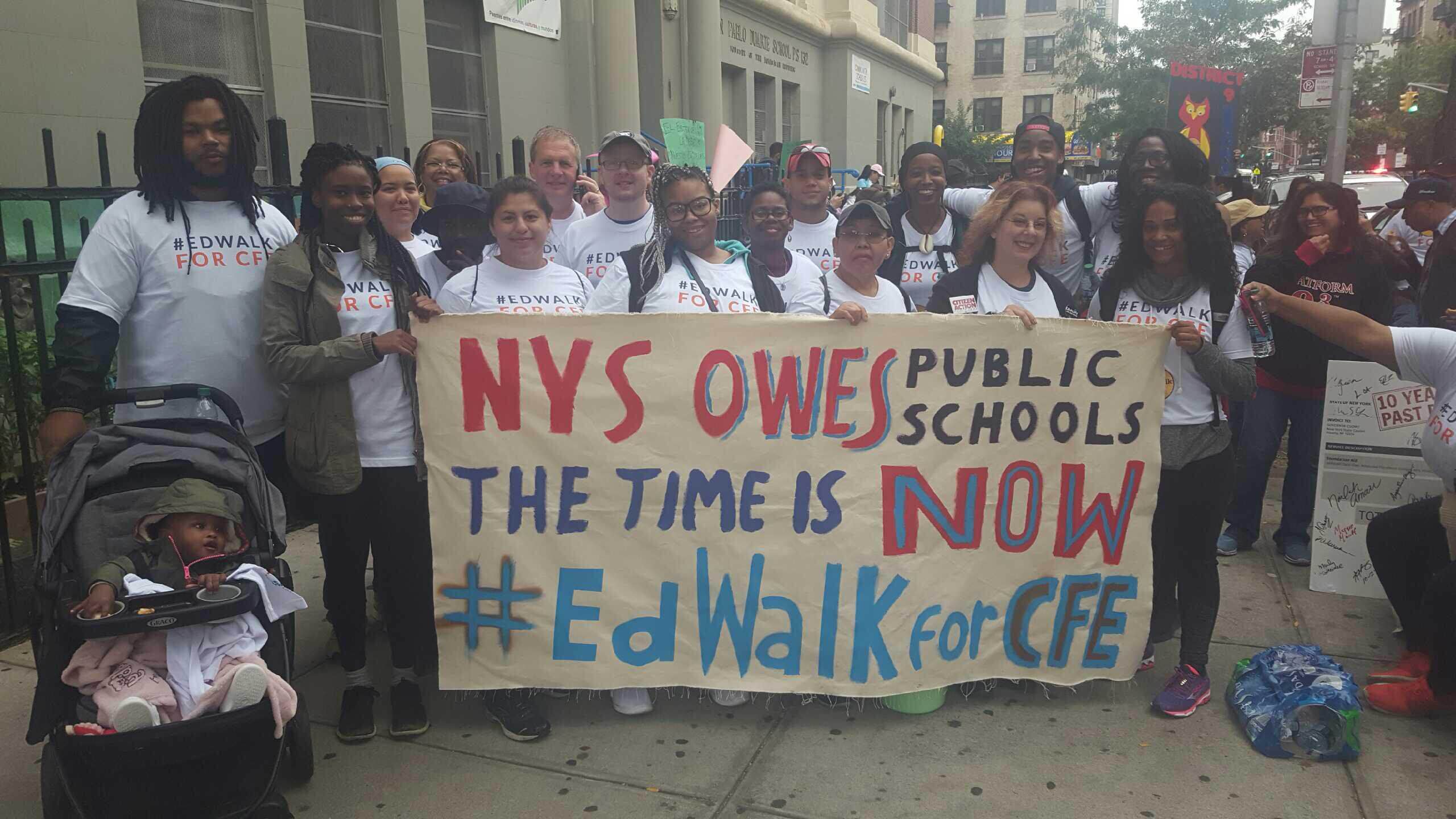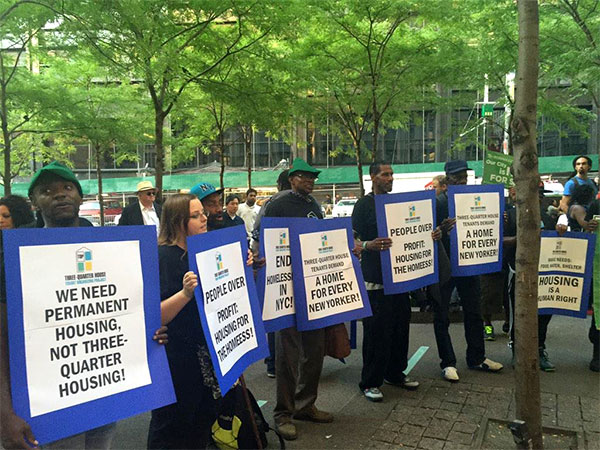Protecting Our Open Public Space Must Be A Top Priority

From Thursday’s protest (photo: @ElizabethStGrdn)
In response to City Council Member Margaret Chin’s op-ed column in Gotham Gazette published Oct. 6, from New York City Community Garden Coalition Executive Director Aziz Dehkan:
The threat to Elizabeth Street Garden violates Mayor de Blasio’s mandate to promote livability for New Yorkers. Supporters of the garden rallied early on Thursday at the pre-submission conference for the Request for Proposals to demand the preservation of this treasured resource, the last open green space in Soho.
The RFP requires 30 years of affordable housing, perhaps a single generation, in a city where the senior population is outpacing all other demographic groups. In three decades, the senior apartments could exit affordability, but a new building would remain atop a community garden sacrificed for fleeting gain.
Council Member Margaret Chin, alone among the local representatives, opposes the community garden under a misguided sense of what “livability” entails. Liveable communities require affordable housing, services, and access to open spaces, most urgently in densifying communities. Her “tough decision” to advocate for housing in place of the Elizabeth Street Garden capitulates to pervasive development pressure.
Public review of the site gave voice to steady opposition of residents, business owners, the community board, and elected officials. The process yielded a resounding “no” to destroying the garden and urged the administration to consider an alternative site within the community district, one that would allow many more units while preserving the community garden.
Council Member Chin acknowledges the impact of the construction boom on the quality of life, but in identifying sites for affordable housing, constant construction has deafened her to constituent calls. Additional park space is needed district-wide, yet she supported the destruction of LaGuardia Corner Gardens, a casualty of NYU’s massive expansion plan in the South Village. She again fails to show consideration for Elizabeth Street Garden.
The coalition of advocates for Elizabeth Street Garden demand the land be dedicated as parkland. Today Elizabeth Street Garden enlivens Soho with year-round programs and sculpture. The City, in a weak effort to assuage the community, asks developers to reserve barely a quarter of the existing garden site for future open space. Operation of the diminished space will be a challenge to integrate into the community and serve the actual needs of visitors.
Privately owned public spaces throughout Manhattan have attracted criticism for using unwelcoming designs and restricting, or effectively eliminating, public use. Our City made this same deal for open space within developments without ensuring accountability decades ago. We should know better than to accept a plan that will wrest land from its public stewards.
The New York City Community Garden Coalition seeks the development of policies for creating community gardens and against their removal. Politicians too commonly position open space against housing, driving a wedge that need not exist. The two are essential aspects of healthy neighborhoods that side-by-side serve long-term needs of a community. Promoting a falsehood that affordable housing and open space are incompatible is disingenuous to the complicated negotiation around the City’s distribution of public land. The Mayor can do better to promote livability by preserving Elizabeth Street Garden in a park-starved neighborhood and redirecting efforts to the larger alternative site.
***
Aziz Dehkan is Executive Director of the New York City Community Garden Coalition.
***
Have an op-ed idea or submission for Gotham Gazette? Email This email address is being protected from spambots. You need JavaScript enabled to view it.
Paying New York’s Debt to Our Children and Their Schools

Marching to Albany (photo: Alliance for Quality Education)
As a mother of two children, I worry every day about how they’re progressing in school. Are they doing their work? Are their teachers providing them with the special attention they need? Is their school giving them all the opportunities to succeed that they deserve?
This is what it means to be a mother. We love our children dearly, and we worry.
And, in New York, we have particular reason to be worried. For families living in high-needs school districts, the simple fact is this: our schools don’t have the resources that they deserve, and this is because New York State has failed to give them the money they need.
Ten years ago, in the landmark Campaign for Fiscal Equity (CFE) case, a judge found that New York State had been violating the constitutional rights of low-income children and children of color by short-changing their schools, where working-class and low-income families are concentrated, out of billions of dollars. The judge was appalled by tremendous inequalities in our schools and mandated that our state government contribute several billions of additional dollars to public schools around the state—with a particular eye to high-needs schools like where my children study.
As a parent and a taxpayer, I thought that the state would comply.
But it hasn’t. According to the Alliance for Quality Education, 10 years after the CFE ruling came down, New York State still owes our schools $3.9 billion. Let me repeat: a full decade after a court demanded that our government provide the resources needed for our schools to offer the places of learning that our children need, the money has not yet materialized.
Now, at schools like my children’s, programs have been cut, and students lack the computers and other technology that are fundamental to modern education and career training. The same does not happen in wealthier communities across the state—some of which have among the best public schools in the country.
It’s just not right, and working-class families of color like mine will not accept being second-class citizens who have to send our children to second-class schools.
That’s why, this week, parents from around the state are marching from New York City all the way to Albany to commemorate the CFE ruling’s anniversary and demand that the Legislature and Governor Cuomo make our schools, and our children, whole.
As we head into the next legislative session, it’s well past time to make sure that our children have the well-resourced schools that they deserve. The Governor, the Senate, and the Assembly must prioritize paying the debt owed to our schools in the upcoming state budget. If they don’t, they will continue to put the future of my children—and millions of other children around the state—in jeopardy.
***
Faceli Álvarez is a member of Make the Road New York, the largest grassroots community organization in New York offering services and organizing the immigrant community. On Twitter: @maketheroadny.
***
Have an op-ed idea or submission for Gotham Gazette? Email This email address is being protected from spambots. You need JavaScript enabled to view it.
Medical Treatment Should Be My Choice, Not My Landlord’s

A rally by Three-Quarter House Tenant Organizing Project
The landlord gave him a choice: go back to using heroin or be kicked out onto the streets. “Do what you do,” the landlord told him. So to keep a roof over his head, after nine months clean and sober, he got high. The landlord let him stay. Strange as this may sound, it was routine where I used to live, and for thousands of tenants across New York City.
I used to live in a “three-quarter house.” These are private, for-profit buildings, where as many as ten tenants may be packed into single rooms at very low rents. Though they aren’t licensed, they call themselves “programs” and promote themselves as “sober homes” or “transitional houses.” They even have names like “Uplifting Men” or “Back on Track.”
Landlords recruit people coming home from jail or prison, exiting rehab, or who have nowhere else to go. They promise “services,” but provide none. Instead, many landlords profit by forcing tenants to attend an outpatient drug treatment program of their choosing, regardless of whether the person wants or needs the treatment. Tenants attend that program daily, because they know that if they don’t, they will lose their housing. The provider of the drug treatment program—which is reimbursed by Medicaid for each participant—then cuts the landlord a portion of those Medicaid reimbursements.
In my house, the landlord, Yury Baumblit, would personally kick us out of bed early each morning and send us to Canarsie Aware Inc. If a tenant couldn’t show proof of attendance, Baumblit would pack their bags and throw them out of the house on the spot. If someone went to treatment elsewhere, they would be evicted. If someone got a job that interfered with their ability to attend the program, they had to quit the job or be evicted.
This scam is widespread and well-known. This year Baumblit was arrested and charged with fraud and illegal evictions. In 2014, the executives of Narco Freedom—the biggest three-quarter house operator in the city—were arrested and indicted for Medicaid fraud and kickbacks for a similar scheme. In 2013, a drug treatment provider called the New York Service Network lost its license after being investigated for Medicaid fraud and kickbacks to landlords.
After these indictments, I was hopeful for change. But these abuses are as rampant as ever and tenants still have few protections.
I’m a member of the Three-Quarter House Tenant Organizing Project (TOP), a group of three-quarter house tenants working in partnership with MFY Legal Services, Neighbors Together, and VOCAL-NY to stop the exploitation of tenants. We have worked with City Council Members Ritchie Torres, Jumaane Williams, Corey Johnson, and Donovan Richards to introduce a package of legislation to protect three-quarter house tenants.
Intro 1168, introduced by Council Member Torres, would make it illegal for private landlords to threaten eviction or retaliation for tenants’ medical treatment choices – exactly what happened to me and so many others. This bill is common sense: landlords are not doctors, and they have no business interfering with or even asking about tenants’ medical choices. It’s also basic fairness: landlords should not be allowed to prey on the health of people who are desperate to keep a roof over their heads. And it’s smart policy: Medicaid kickback scams cheat the State out of millions of dollars and take up scarce treatment resources.
Intro 1168 by itself won’t solve the deeper problems that allow three-quarter houses to exist -- the severe shortage of truly affordable housing and the lack of options for people in recovery and reentry – but it will strike a critical blow against exploitation. If Intro 1168 had been the law back when I lived at Baumblit’s house, getting treatment would have been my choice, not his. Most importantly, if it becomes law now, it will help stop the next landlord who gets the idea to exploit New York’s most marginalized tenants for personal profit. We need this law now, before another tenant is forced to choose between health and home.
***
Darryl Gates is a member of the Three-Quarter House Tenant Organizing Project (TOP). He is a former three-quarter house tenant.
***
Have an op-ed idea or submission for Gotham Gazette? Email This email address is being protected from spambots. You need JavaScript enabled to view it.




